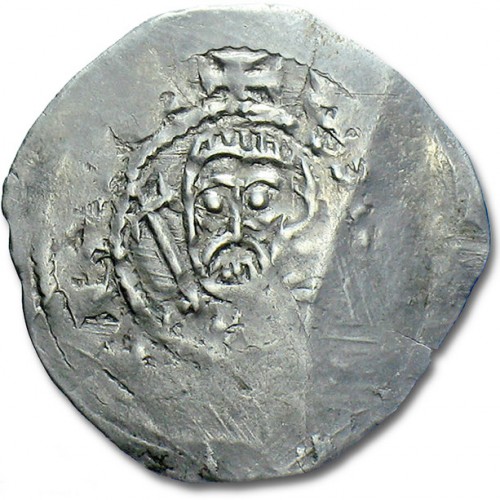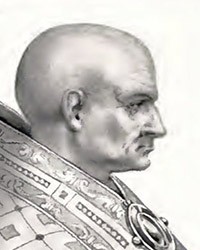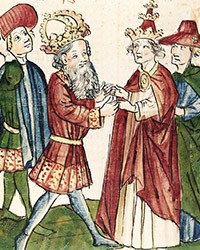
Silver papal coin from the times of Pope Agapetus II and Alberic II
For nearly a quarter of a century he was the unquestionable ruler of Rome, achieving this position thanks to a blemish upon his honor, which was a slap in the face. In this way a legend was born, of a humiliated son, who seeks retribution, rebelling against his mother and a brutal stepfather. Was it then an insult, or a well-directed plan – let us judge for ourselves.
For nearly a quarter of a century he was the unquestionable ruler of Rome, achieving this position thanks to a blemish upon his honor, which was a slap in the face. In this way a legend was born, of a humiliated son, who seeks retribution, rebelling against his mother and a brutal stepfather. Was it then an insult, or a well-directed plan – let us judge for ourselves.
This event was to have occurred during a dinner held a month after the wedding (932) of Alberic’s mother, Marozia, with her third husband Hugh of Arles. Furious at being insulted in such a way by his stepfather, after he had spilled water for washing hands onto his robes, the youth hurriedly left Rome, only to reappear a few weeks later at the head of an armed force. Hugh of Arles was able to escape from the city, descending on a rope from the walls of the Castle of the Holy Angel. The older brother of Alberic, Pope John XI as well as his mother remained in Rome. The youth with a slogan to free the city from harlots (meaning Marozia and her sister Theodora the Younger) and a barbarian from the North (Hugh of Arles), quickly took over the city, then imprisoning his mother and locking the pope away in the Lateran Palace, limiting his actions to a minimum – so much so that we can easily call John a prisoner of the Lateran.
Who was then this brash greenhorn, who seemed to be the savior of Rome? He was born as the second son of Marozia and the Duke of Spoleto, Alberic I. For years he remained in the shadow of his older brother, whom their mother elevated to the papal throne (John XI), he did not favor her third marriage, this time with the King of Italy, Hugh of Arles. The couple’s ambition to obtain the imperial crown seemed to be within reach, yet all this went against everything that Alberic II had hoped for. As it turned out, inciting Romans against his mother and her new husband, he put into action a plan which no Roman aristocrat before him could bring to fruition. He announced himself to be, through divine will, a duke and a senator of all Romans, in this way elevating Rome to the rank of one of the Italian duchies (such as Venice and Naples). He promised the Romans that they would never again have to listen to a king or an emperor and that they could govern themselves, while the pope would only wield spiritual authority over the Christian world, but profits from it would go to the new duchy of Alberic II.
Having dealt with his family he was ready for a proper marriage. Whom did our brave hero choose, the one who not long ago spoke out against a barbarian from the North? The very barbarian’s daughter and his own stepsister – Alda! The marriage was concluded in 936, while the result of this relationship (although in this case the mother is uncertain) was Octavianus – the future Pope John XII.
Alberic II, just as his father and grandfather had done before him, occupied himself with establishing order and made his brother, Pope John XI do all his bidding. When the pope died in 935, a monk who fully accepted the leading role of the duke of Rome ascended to St. Peter’s throne – Leo VII, and after him Stephen VIII, Marinus II, and Agapetus II. All of them approved of the new order and the title of duke for Alberic II. If that was not enough, the Benedictine monk who came to Rome from Cluny – Odo of Cluny, a representative of the Reformative branch in the Church (struggling against simony, excessive wealth and the secularization of the clergy), was welcomed with honors by Pope John XI and Alberic II, while the latter gave him properties in the State of the Church, including the Monastery of St. Paul, as well as his own palace on Aventine Hill (near the Church of Santi Bonifacio e Alessio).
Alberic II was fully aware of his own political limitations, that is why he concentrated on ruling the city, which under his reign experienced a period of a long-awaited peace and prosperity. And it was because of the particular interests of Romans, that he denied the request of the Prince of Saxony and the King of Germany Otto I, when he asked for the imperial crown in exchange for the defense of the Church. This was the first act of a political game played by the ambitious German king with the family of the counts from Tusculum, but by no means the last. The Duke of Rome, apparently realized that the time of peace and prosperity could come to an end. Black clouds started gathering over his duchy. The might of Otto I grew, while the “enslavement” of the popes which he carried out began to be more and more criticized. A beneficial solution seemed to be a renewed unification of spiritual and secular authority in the hands of one man. Seeing this, Alberic decided to change his policies, and going against all traditions did something without precedence. Feeling close to death – as the chronicler Benedict of Soracte claimed – he recommended and obliged the Roman clergy and aristocrats, to after the death of the current pope, Agapetus II, elect his (Alberic’s) son to the post of pope in this way once again uniting two functions, which were until then independent. He probably did not assume, that his successor, at that time a mere seventeen year old, less than a year later would also become the successor of St. Peter, taking on the name of John XII in honor of his uncle (John XI). The inexperienced youth, who apparently valued the pleasures of life in all sense of the word, was not fit for his new role – the ruler of Rome and the vicar of St. Peter, especially since he was soon to face an experienced political adept of that time – the aforementioned Otto I. I will only say that, his defeat was great and humiliating, while the family of the counts and dukes of Tusculum which had for decades ruled Rome and ensured the city with the longest period of stability and peace in the Middle Ages, lost power. However, they would return later.










